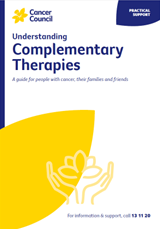- Home
- About Cancer
- Advanced cancer
- Living with advanced cancer
- Treatment for advanced cancer
- Complementary and alternative therapies
Complementary therapies for advanced cancer
It’s common to wonder whether there are any other therapies you could try. You may want help managing the symptoms and side effects of conventional cancer treatment, such as fatigue, nausea or pain. Some people use therapies to help feel some control over their treatment.
Learn more about:
What are complementary therapies?
Complementary therapies are treatments used alongside conventional cancer treatments, such as chemotherapy or radiation therapy, to improve general health and wellbeing. Check with your doctor if you are unsure about a particular complementary therapy.
Research has shown that some complementary therapies can help people manage the various emotional and physical effects of cancer and its treatment.
Examples include:
- anxiety – meditation, relaxation, mindfulness, counselling, support groups, art therapy, music therapy, massage, hypnotherapy
- fatigue – meditation, relaxation, exercise
- pain – hypnotherapy, acupuncture, visualisation, massage, reflexology, acupressure, meditation, relaxation
- stress – meditation, relaxation, counselling, support groups, spiritual practices
- nausea and vomiting – acupuncture, hypnotherapy.
Cancer treatment centres and palliative care services may offer free therapies (e.g. art therapy, massage, meditation). Some community centres offer group therapies, such as tai chi or yoga, for free or for a small charge. Often you will see a private practitioner and pay for most complementary therapies. If you have private health insurance, check if it provides a rebate for visits to a private practitioner.
For more on this, see Complementary therapies.
Let your doctor and pharmacist know if you plan to use any complementary or alternative therapies to make sure they do not result in harmful side effects or interfere with other medicines you are taking.
Alternative therapies
Alternative therapies are commonly defined as treatments used instead of conventional medicine. Many alternative therapies have not been scientifically tested, so there is no proof they stop cancer growing or spreading. Others have been tested and shown not to work.
When cancer has spread and treatment options are limited, some people consider alternative therapies. Friends and family may also suggest that you try alternative treatments. While side effects of alternative therapies are not always known, some can be harmful – for example, taking high-dose vitamins can have side effects, and eliminating food groups could mean that your diet no longer provides all the nutrients you need. Some alternative therapies may be expensive, and they could affect management of your symptoms.
Be suspicious if any treatment:
- claims to cure all cancers
- requires you to travel overseas
- says the medical/pharmaceutical industry wants to stop its use
- suggests it has positive results with few or no side effects.
Cancer Council does not recommend the use of alternative therapies as a treatment for cancer. The Australian Competition and Consumer Commission tracks health and medical scams to help the public detect and avoid scams.
To find out more, visit scamwatch.gov.au.
→ READ MORE: Your healthcare team for advanced cancer
Meditation and Relaxation Podcast
Listen to more of our meditation and relaxation podcast for people affected by cancer
Dr Lucy Gately, Medical Oncologist, Alfred Health and Walter and Eliza Institute for Medical Research, VIC; Dr Katherine Allsopp, Supportive and Palliative Care Specialist, Westmead Hospital, NSW; A/Prof Megan Best, The University of Notre Dame Australia and The University of Sydney, NSW; Dr Keiron Bradley, Palliative Care Consultant, Medical Director Palliative Care Program, Bethesda Health Care, WA; Craig Brewer, Consumer; Emeritus Professor Phyllis Butow, Psychologist, The University of Sydney and Chris O’Brien Lifehouse, NSW; Louise Durham, Palliative Care Nurse Practitioner Outpatients, Princess Alexandra Hospital, Metro South Palliative Care, QLD; Dr Roya Merie, Radiation Oncologist, ICON Cancer Centre, Concord, NSW; Penny Neller, Project Coordinator, National Palliative Care Projects, Australian Centre for Health Law Research, Queensland University of Technology, QLD; Caitriona Nienaber, 13 11 20 Consultant, Cancer Council WA; Xanthe Sansome, Program Director, Advance Care Planning Australia, VIC; Sparke Helmore Lawyers; Peter Spolc, Consumer.
View the Cancer Council NSW editorial policy.
View all publications or call 13 11 20 for free printed copies.
Need to talk?
Support services
Coping with cancer?
Speak to a health professional or to someone who has been there, or find a support group or forum
Need legal and financial assistance?
Pro bono services, financial and legal assistance, and no interest loans
Cancer information
Dealing with the diagnosis
Common reactions to a cancer diagnosis and how to find hope
Explore our resource hub
Explore and download our booklets, fact sheets, podcasts, webinars and videos for people affected by cancer
